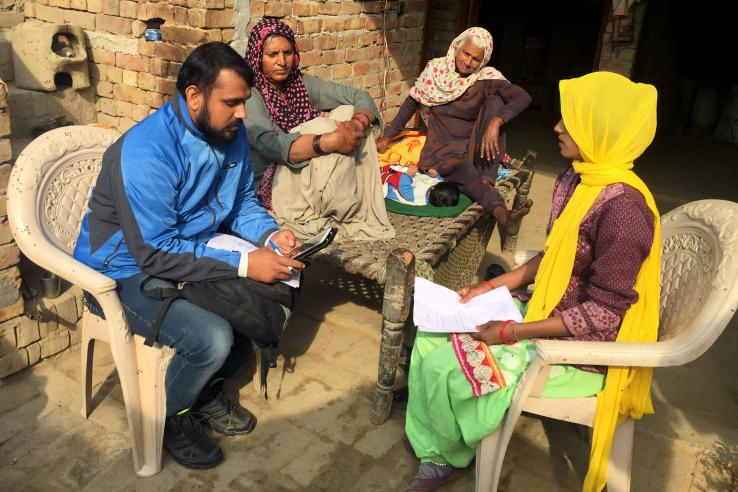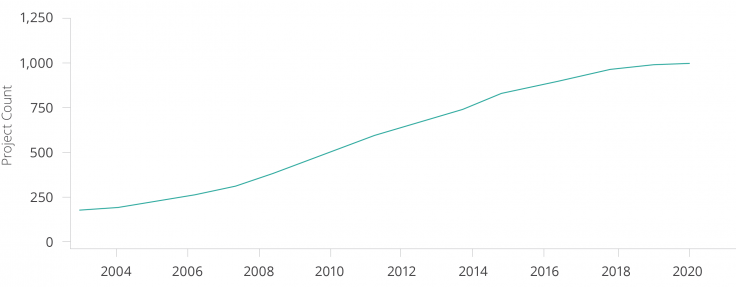
Celebrating a milestone: 1,000 randomized evaluations by J-PAL affiliates

Back in February of this year, J-PAL hit a milestone: our affiliates collectively conducted over 1,000 randomized evaluations.
Six months later, we revisit this milestone with a new perspective. As the pandemic drags on, our body of work has expanded to include over two dozen new evaluations aimed at generating urgently needed evidence for the fight against COVID-19. We have also leveraged our affiliates’ expertise and our extensive library of evaluations to provide evidence-based insights to inform the design of policies to support the world’s poorest and most vulnerable in this time.
Our ability to respond quickly to urgent demands for evidence during the COVID-19 pandemic is due to this impressive body of pre-existing research. These 1,000+ evaluations are the result of the vision and dedication of our affiliated professors, but also a veritable army of behind-the-scenes contributors. To run a randomized evaluation in the field requires so much more than an interesting research question: The commitment of implementers, the data collection expertise of local enumerators, the trust and participation of local communities, and the hard work of research staff.
J-PAL was created in part to help strengthen the partnerships and research infrastructure to make this research possible. When Abhijit Banerjee, Esther Duflo, and Sendhil Mullainathan co-founded J-PAL in 2003, our first cohort of affiliates consisted of just five professors with (at the time) only a handful of randomized evaluations to their names: Marianne Bertrand, Dean Karlan, Michael Kremer, Dan Levy, and Edward Miguel.
Since then, our network of researchers has grown to include 194 professors committed to rigor, purpose, and innovation in their randomized evaluations. But the movement to bring scientific evidence into policymaking has grown far beyond the participation of our affiliates. J-PAL and Innovations for Poverty Action (IPA), along with many other organizations, have expanded into an infrastructure of over a thousand talented staff committed to making a difference at every step of the research-to-policy process.
Every single one of the 1,000 evaluations we celebrate today was made possible by teams of hardworking enumerators, field team managers, and research assistants, as well as the goodwill and patience of the hundreds of thousands of respondents who participated in the research. A strong local research infrastructure is essential not only to carrying out successful data collection, but also to ensuring that research is grounded in the local context and implemented with respect.
Our research staff has been the backbone of J-PAL’s regional offices. For instance, Shobhini Mukerji was one of our earliest field staff, starting as a research assistant in the Odisha clean cookstoves project. Today, she is among the longest-serving staff members of J-PAL. Now the Executive Director of J-PAL South Asia, she heads J-PAL’s largest office and manages its significant expansion into policy outreach and capacity building.
In addition to supporting research in the field, J-PAL’s research and training staff work to create the next generation of evaluators and equip them with the resources and tools they need. This dedicated team develops research resources that are accessible to all; supports research design and implementation, providing crucial support to projects on the ground in dozens of countries around the world; and trains the next generation of local researchers in randomized evaluation methodology.

Some of our earliest evaluations have had a profound influence on J-PAL’s direction. An early partnership with the Indian NGO Pratham to evaluate the “Balsakhi” remedial tutoring program (Banerjee et al. 2007) grew into an over two decades-long collaboration to test, adapt, and scale up what came to be known as the Teaching at the Right Level approach.
Kremer and Miguel’s (2003) evaluation of primary school-based deworming produced experimental evidence showing that deworming is one of the simplest and most effective ways to help children stay healthy and remain in school. Subsequent evaluations and resolute efforts by Kremer, Evidence Action, and others to scale the intervention led to over 292 million children being dewormed. These early evaluations, along with many others (Duflo, Kremer, and Robinson 2008, Kremer, Miguel, and Thornton 2009, and Dupas 2011, to name a few), helped open doors for high-potential research efforts and policy collaborations.
A fundamental aspect of J-PAL’s work is to make evidence from randomized evaluations accessible to broader audiences. To this end, we’ve written hundreds of jargon-free summaries of results of evaluations and published them to our website. (Some of the 1,000 evaluations are ongoing, so don’t yet have summaries—stay tuned!)
In addition, with the guidance of our academic co-chairs, we’ve synthesized evidence from across evaluations to produce actionable policy insights and practical recommendations, as well as produced several rapid-response notes highlighting evidence to inform COVID-19 response policies.
And we’ve written up a series of case studies documenting just a few of the many ways in which evidence from randomized evaluations is changing how we understand and address problems related to poverty.
In addition to documenting and synthesizing research, J-PAL staff serve as “matchmakers,” helping connect our affiliated professors with implementing partners to catalyze new research and innovation. We are also connecting our affiliates to policymakers seeking expert advising on their COVID-19 response policies, which has already led to several innovative new social programs.
Also to this end, and with the generous support of our donors, we run competitive funding initiatives for researchers to support randomized evaluations that seek solutions to policy challenges in governance, post-primary education, healthcare delivery, and financial inclusion, to name just a few. We have also been able to run off-cycle rounds to fund rapid, useful, and safe COVID-19 research.
As we look to the future, we are focused on expanding our library of research resources and training courses, drawing out even more critical lessons that provide practical guidance for policymakers, supporting scale-ups of effective programs, and expanding the evidence base on key issues like health care delivery, social protection, climate change, and labor.
We are incredibly grateful for the passion and dedication of our ever-growing affiliate network and the many, many staff and partners who constitute the movement to bring scientific evidence into the conversation around poverty alleviation, without whom J-PAL would only be an ambitious idea. And thank you, reader, for accompanying us on this seventeen-year journey.


